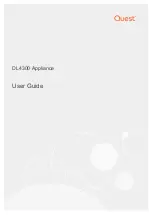
RAID 0 provides the fastest storage access but does not provide any redundant information about the
stored data. RAID 1, RAID 3, RAID 5, and RAID 6 write redundancy information to the disk drives to
provide fault tolerance. The redundancy information might be a copy of the data or an error-correcting
code that is derived from the data. In RAID 1, RAID 3, RAID 5, or RAID 6 configurations, if a disk drive
fails, the redundancy information can be used to reconstruct the lost data. Regardless of the RAID level
that you choose, you can configure only one RAID level across each subsystem. All redundancy
information for an subsystem is stored within the subsystem. The following table lists the RAID levels
and describes the configuration capabilities of each level.
Table 4-5. RAID Level Configurations
RAID
Level
Configuration
0
Non-redundant striping mode
– Use this level for high-performance
needs. RAID 0 does not provide any data redundancy. RAID 0 stripes
data across all of the disk drives in the subsystem. If a single disk drive
fails, all of the associated logical drives fail and all data is lost. RAID 0
is suited for noncritical data. It is not recommended for high-availability
needs.
1
Striping mirroring mode
– RAID 1 uses disk drive mirroring to create
an exact copy from one disk drive to another disk drive. A minimum of
two disk drives are required; one for the user data, and one for the
mirrored data. RAID 1 offers high performance and the best data
availability.
Data is written to two disk drives simultaneously. If one disk drive in a
pair fails, the system can instantly switch to the other disk drive
without any loss of data or service. Only half of the disk drives in the
subsystem are available for user data. If a single disk drive fails in a
RAID 1 subsystem, all of the associated logical drives become degraded,
but the mirror disk drive provides access to the data. RAID 1 can
survive multiple disk drive failures as long as no more than one failure
occurs per mirrored pair. If a disk drive pair fails, all of the associated
logical drives fail, and all data is lost.
3
High-bandwidth mode
– RAID 3 stripes both user data and
redundancy data (in the form of parity) across the disk drives. The
equivalent of the capacity of one disk drive is used for the redundancy
data. RAID 3 works well for large data transfers in applications, such as
multimedia or medical imaging, that write and read large sequential
chunks of data.
If a single disk drive fails in a RAID 3 subsystem, all of the associated
logical drives become degraded, but the redundancy data lets the data
be reconstructed. If two or more disk drives fail, all of the associated
logical drives fail, and all data is lost.
5
High I/O mode
– RAID 5 stripes both user data and redundancy data
(in the form of parity) across the disk drives. The equivalent of the
capacity of one disk drive is used for the redundancy data. RAID 5
works well for multiuser environments, such as databases or file system
storage, where typical I/O size is small, and a high proportion of read
activity exists.
If a single disk drive fails in a RAID 5 subsystem, all of the associated
logical drives become degraded, and the redundancy data permits the
data to be reconstructed. If two or more disk drives fail, all of the
associated logical drives fail, and all data is lost.
4-14
IBM System Storage DS3000, DS4000, and DS5000: Command Line Interface and Script Commands Programming Guide
Summary of Contents for System Storage DS3000
Page 599: ...Appendix A Examples of information returned by the show commands A 3...
Page 601: ...Appendix A Examples of information returned by the show commands A 5...
Page 603: ...Appendix A Examples of information returned by the show commands A 7...
Page 605: ...Appendix A Examples of information returned by the show commands A 9...
Page 607: ...Appendix A Examples of information returned by the show commands A 11...
Page 609: ...Appendix A Examples of information returned by the show commands A 13...
Page 611: ...Appendix A Examples of information returned by the show commands A 15...
Page 623: ...Appendix A Examples of information returned by the show commands A 27...
Page 625: ...Appendix A Examples of information returned by the show commands A 29...
Page 627: ...Appendix A Examples of information returned by the show commands A 31...
Page 651: ......
Page 652: ...Part Number 00W1466 Printed in USA GA32 0961 05 1P P N 00W1466...
















































